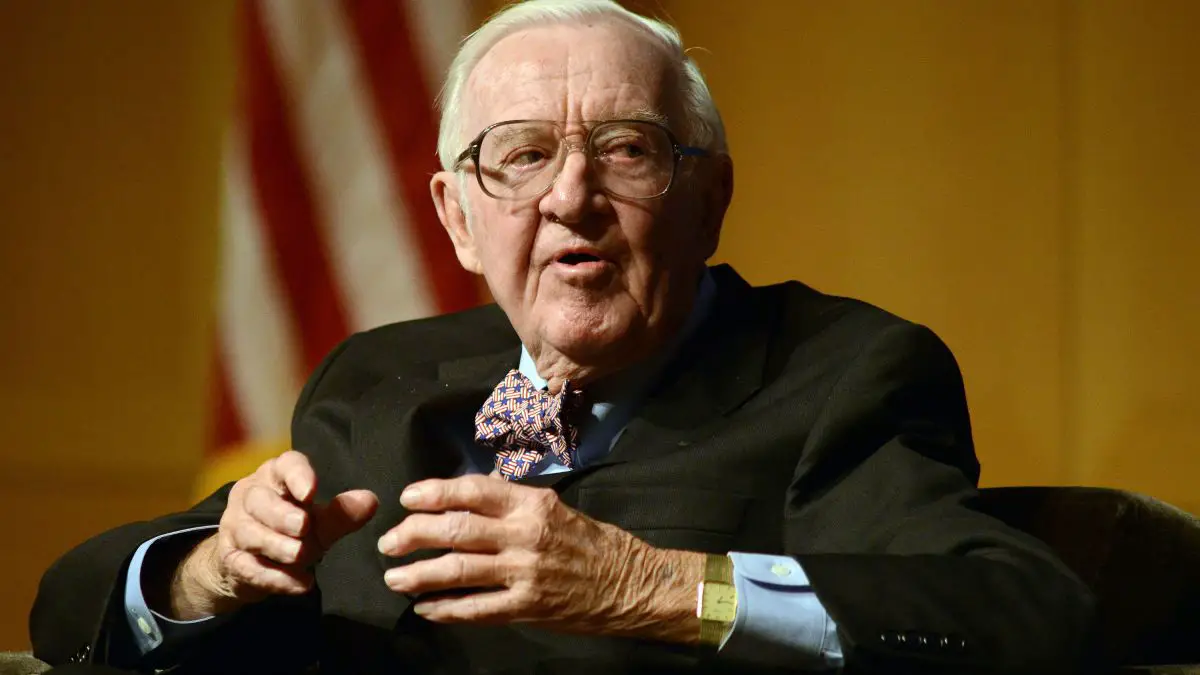Former U.S. Supreme Court Justice John Paul Stevens (appointed by Gerald Ford in 1975, resigned 2010) has written an opinion piece in the New York Times, calling for repeal of the Second Amendment. This is the first time that option has been seriously proposed, and shows that the furor over the Parkland school shooting is not dying out quickly, as with responses to every other gun-massacre.
The Times piece is quite straightforward.
Rarely in my lifetime have I seen the type of civic engagement schoolchildren and their supporters demonstrated in Washington and other major cities throughout the country this past Saturday. These demonstrations demand our respect. They reveal the broad public support for legislation to minimize the risk of mass killings of schoolchildren and others in our society.
That support is a clear sign to lawmakers to enact legislation prohibiting civilian ownership of semiautomatic weapons, increasing the minimum age to buy a gun from 18 to 21 years old, and establishing more comprehensive background checks on all purchasers of firearms. But the demonstrators should seek more effective and more lasting reform. They should demand a repeal of the Second Amendment.
Stevens goes on to explain the “original intent” of the Amendment:
Concern that a national standing army might pose a threat to the security of the separate states led to the adoption of that amendment, which provides that “a well regulated militia, being necessary to the security of a free state, the right of the people to keep and bear arms, shall not be infringed.” Today that concern is a relic of the 18th century.
For over 200 years after the adoption of the Second Amendment, it was uniformly understood as not placing any limit on either federal or state authority to enact gun control legislation. In 1939 the Supreme Court unanimously held that Congress could prohibit the possession of a sawed-off shotgun because that weapon had no reasonable relation to the preservation or efficiency of a “well regulated militia.”
And that view was universal until recently, according to Stevens, including even the conservative chief justice, Warren Burger, who denied the unlimited individual right to bear arms:
Chief Justice Burger publicly characterized the N.R.A. as perpetrating “one of the greatest pieces of fraud, I repeat the word fraud, on the American public by special interest groups that I have ever seen in my lifetime.”
The reaction was swift from Fox News.
[Fox News Personality] Jesse Watters reacted to an op-ed by retired Supreme Court Justice John Paul Stevens who said “March For Our Lives” participants should seek a repeal of the Second Amendment.“There’ll be a Civil War if you take away the Second Amendment,” Watters said. “[The government would say] surrender your weapons or else.”
Watters said many Americans would object to federal agents seeking arms confiscation, and the policy change would cause “an absolute bloodbath.”
That is, of course, silly hyperbole. Nobody, including Stevens, suggests arms confiscation, much less violently doing so. Repeal of the Second Amendment would just eliminate the knee-jerk opposition to any legislation with the word “gun” in it. It would take separate legislation to make any change in the current laws regarding guns.
After all, there’s nothing in the Constitution that says that you may own a car. Many of us own two or three. But it is possible to pass laws to make those cars more safe, to make roads more safe, and to see that drivers can not only see, but you know, know how to drive. Cars have become much safer, thanks to study—but it’s illegal to even study gun safety, according to current laws.
Meanwhile, an editorial in the Washington Post suggests that five words could “correct” the Second Amendment:
“A well regulated Militia, being necessary to the security of a free State, the right of the people to keep and bear Arms when serving in the Militia shall not be infringed.” [Emphasis added]
That may sound good, but it would actually be more restrictive than full repeal. If this wording were added to the Amendment, it would not make gun ownership an “unspecified right,” but would suggest that ONLY military people should have weapons.
Another conservative paper joined the discussion. The Chicago Tribune says Stevens is wrong.
In the first place, it’s politically impossible. A constitutional amendment requires ratification by 38 states. Donald Trump carried 30. To repeal the Second Amendment, you’d have to get every state that voted for Hillary Clinton, plus 18 that didn’t, to agree. For the foreseeable future, that has zero chance of happening.
The second defect is any such effort would inflame the worst fears of gun owners and those sympathetic to gun rights. Many of them agree on the need for more regulation — or could be persuaded. Once the debate is about scrapping a constitutional right, though, many will assume that any seemingly reasonable new regulation is just a step toward total confiscation.
I agree that it would be impossible for the NRA-intimidated Congress to pass a new amendment, and it would be a long-shot to promote the amendment by grassroots petition.
What Stevens suggests is what Congress calls a “nuclear option” for problems that wouldn’t require such drastic action. It won’t happen, of course. However, it does show the depth and force of gun-violence opponents this time, and while it might not pass, fear of continuing public outrage might at least get the NRA to the negotiating table.
To put it succinctly, as John F. Kennedy said, “Those who make peaceful revolution impossible, make violent revolution inevitable.”
Donate Now to Support Election Central
- Help defend independent journalism
- Directly support this website and our efforts
